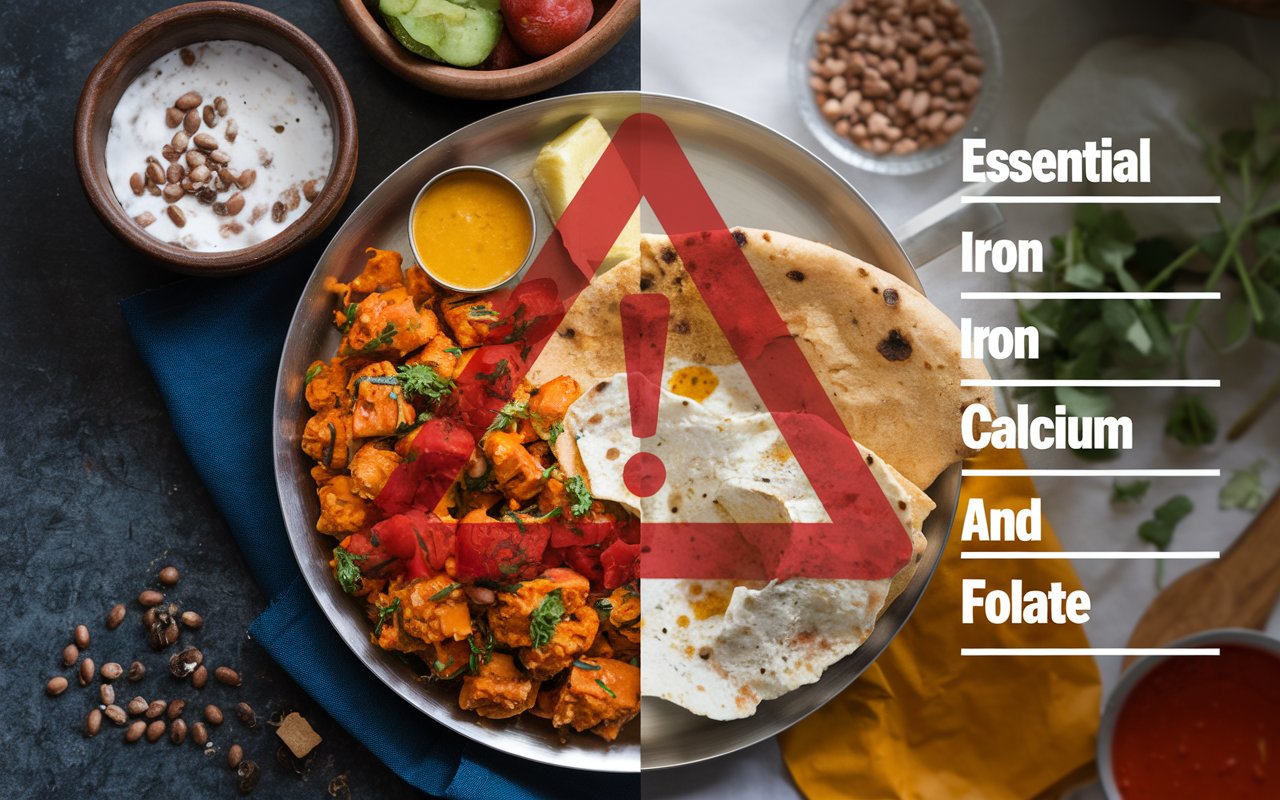Have You Ever Felt Dizziness After Suddenly Waking Up? That’s a Sign of Iron Deficiency.
Iron deficiency is a common issue that many people overlook until the symptoms become too hard to ignore. If you’ve ever felt lightheaded or dizzy after abruptly waking up, it could be your body’s way of telling you that your iron levels are lower than they should be.
However, a recent study published in The Lancet Global Health journal reveals a concerning trend in India—deficiencies in essential micronutrients such as iron, calcium, and folate. This article delves into the findings of the study, explores the implications of these deficiencies, and discusses possible solutions to this growing health crisis.
The Growing Concern of Micronutrient Deficiencies in India

A recent study published in the prestigious medical journal The Lancet has shed light on a critical health issue facing India. The research, which examined micronutrient intake across 185 countries, paints a concerning picture of nutritional deficiencies among the Indian population.
The study’s findings are a wake-up call for public health officials and policymakers, led by experts from renowned institutions such as Harvard T.H. Chan School of Public Health and UC Santa Barbara, along with the Global Alliance for Improved Nutrition (GAIN). The conclusion is clear: Indians of all ages and genders are not consuming enough of these vital micronutrients. The typical Indian diet is particularly deficient in iron, calcium, and folate—nutrients necessary for some body processes.
A worldwide view of the problem is made possible by the study’s extensive methodology, which covers a large number of nations. The attention being paid to India’s nutritional issues is especially significant, though, because of the vast and varied population of the nation.
The Role of Iron in Health
Iron is an essential component of hemoglobin, the protein in red blood cells responsible for carrying oxygen throughout the body. Iron deficiency can lead to anemia, a condition characterized by fatigue, weakness, and shortness of breath. The Lancet study highlights that iron deficiency is prevalent across India, affecting both men and women. This deficiency poses a significant health risk, particularly for women of childbearing age, who require higher iron levels to support menstruation, pregnancy, and childbirth. Know More: https://theaspectratio.in/health-fitness/can-what-you-eat-affect-your-stress-levels-new-research-suggests-mediterranean-diet-is-key/
Calcium: The Foundation of Strong Bones
Calcium is a very vital element for bones and teeth. Besides these, it has an important role in muscular functions, transmission of nerves, and blood coagulation. The study indicates that consumption of calcium is considerably low within age groups of 10-30 years, which is a very important age group for the development of bones. This fact is alarming because the intake of insufficient calcium at this developing stage reduces the density of bones, hence resulting in a higher chance of developing osteoporosis afterward in life.
Folate: Essential for Cell Division and Growth
Folate, also known as vitamin B9, is essential for DNA synthesis and repair, as well as cell division and growth. It is particularly important for pregnant women, as it helps prevent neural tube defects in developing fetuses. The Lancet study indicates that folate deficiency is widespread in India, which could have severe implications for maternal and child health.
The Impact on Women’s Health

The comprehensive Lancet study has uncovered a troubling gender gap in India’s nutritional landscape. Women, particularly those in their reproductive years, are bearing the brunt of micronutrient deficiencies, with alarming implications for maternal and child health.
The study shows that Indian women are more likely than men to be deficient in important nutrients such as iron, vitamin B12, and iodine. This gender discrepancy is more than just a nutrition issue; it is a major public health concern with far-reaching effects. For women of childbearing age, these deficits can have a long-term impact on pregnancy outcomes. A lack of vital nutrients raises the chance of low birth weight kids, which can lead to long-term health issues. The increased risk of maternal death associated with these dietary deficiencies is even more concerning.
The study shows that inadequacies in iodine and iron consumption are not limited to women; deficiencies also affect men. Compared to women, men in India are more likely to receive insufficient levels of zinc, magnesium, and vitamin C. While magnesium is essential for the health of muscles and nerves, zinc is necessary for immune system function. Tissue healing and immune system support depend on vitamin C, a potent antioxidant. The absence of essential minerals can worsen general health and make people more vulnerable to infections and long-term illnesses.
Highlights:
- Lancet Study: Over half of the Indian population is deficient in essential micronutrients.
- Critical Shortages: Iron, calcium, and folate deficiencies are particularly alarming.
- Age and Gender Impact: The study reveals significant differences in nutrient deficiencies across age groups and genders.
- Global Implications: The findings emphasize the global challenge of malnutrition, with specific concern for South Asia and Sub-Saharan Africa.
Expert Insights on Addressing Micronutrient Deficiencies
According to professionals, one of the best ways of fighting micronutrient deficiency is a well-balanced diet abundant in fruits, vegetables, whole grains, and lean proteins. If there is variety in one’s diet, that will ensure taking in a great spectrum of vitamins and minerals. For example, leafy vegetables, nuts, and seeds contain a great amount of folate; products made from milk and also some fortified cereals contain calcium. Iron can be found in red meat, poultry, and legumes.
The Role of Fortification and Supplementation
Food fortification and supplementation are emerging as key strategies in India’s battle against widespread nutritional deficiencies. These approaches offer practical and cost-effective solutions to improve the nation’s nutritional status on a large scale.
Fortified foods are proving to be powerful weapons in this fight. By adding essential nutrients to staple foods, fortification can reach millions of people through their daily diets. Iodized salt, for instance, has been a success story in combating iodine deficiency disorders. Similarly, fortified flour can deliver crucial vitamins and minerals to a vast population, regardless of socioeconomic status
The beauty of food fortification lies in its simplicity and affordability. It doesn’t require people to change their eating habits drastically. Instead, it enhances the nutritional value of foods they’re already consuming. This makes it an attractive option for policymakers looking to improve public health without significant behavioral interventions.
Public health professionals should be concerned with the prevention of micronutrient deficiency through evidence-based intervention. This involves dietary education, fortification of food for better access, and policies to improve nutrition programs. Achieving success in these areas requires collaboration among governmental, non-governmental, and private-sector parties. Also read: https://www.indiatodayne.in/lifestyle/story/study-reveals-widespread-micronutrient-deficiencies-across-all-age-groups-in-india-1082260-2024-08-30
Though supplements and fortification are effective tools, it’s crucial to remember that they are not miracle cures. They function best when included in a whole nutrition plan that also consists of food variety and nutrition instruction. India can significantly improve the health of its populace and address its nutritional issues by combining these strategies.
A Healthier India Through Improved Nutrition
India’s rapid development and urbanization are reshaping its nutritional landscape, bringing both new challenges and promising opportunities to tackle micronutrient deficiencies. The country’s urban growth is transforming dietary patterns at an unprecedented pace. As more Indians move to cities, traditional eating habits are giving way to modern diets. This shift often means increased consumption of processed foods, which can be low in essential nutrients. However, this change also opens doors for innovative nutritional interventions.
Foods that taste good and are packed with needed nutrients are being developed to respond to this. More fortified snacks, vitamin-rich beverages, and nutrient-dense convenience foods line up on store shelves. This trend can go a long way in solving the micronutrient deficiencies, at least in urban populations.
E-commerce and food delivery services have also reshaped ways of access to foods for Indians. These could be used as platforms for not only the promotion but also the distribution of nutrient-dense options down to the level of choice of millions of consumers.
People can boost their intake of micronutrients in a realistic way to address the inadequacies that the Lancet study showed. These include including a range of nutrient-dense foods in their diet, using fortified products, and considering supplementation as needed. Public health initiatives can also promote healthy eating practices and increase knowledge of the significance of micronutrients.
The findings of the Lancet study serve as a wake-up call for India and the global community. Addressing micronutrient deficiencies is crucial for improving public health and ensuring a healthier future for all.



 By
By

















